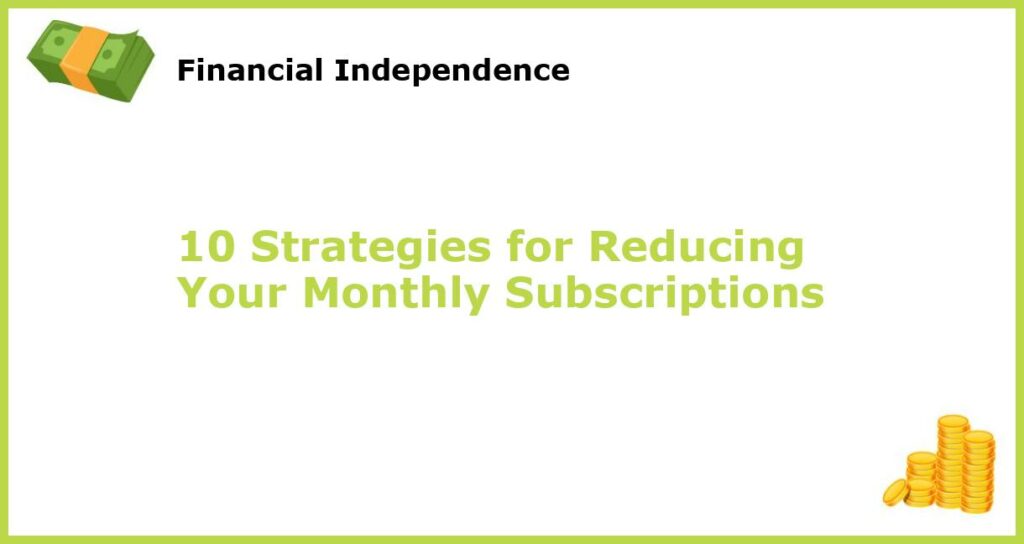Hello there! Are you tired of spending too much money each month on unnecessary services? If so, you’re not alone. Many people are looking for ways to reduce their monthly subscriptions and save money. Fortunately, there are several strategies you can use to lower your costs without sacrificing quality. Here are 10 strategies for reducing your monthly subscriptions:
Audit Your Monthly Subscriptions

The first step in reducing your monthly subscriptions is to take stock of what you are currently subscribed to. This means going through your bank statements or credit card bills and making a list of all the services you are paying for each month. Once you have a list, you can start to identify any services you no longer need or can do without.
Take some time to assess each subscription service and determine if you really need it or not. Consider whether your usage frequency of the service justifies its cost or if it’s something that you can live without. You might be surprised at how many services you are subscribed to without even realizing it. Remember, the goal is to cut out the services you don’t use, so you can redirect that money to things that you really value.
Additionally, organizing your expenses in this way can help you have better control of your finances, and you can be more mindful of your subscriptions.
Eliminate Duplicate Services

If you have multiple subscriptions that offer the same service, it’s time to eliminate the duplicates. For example, if you have both Netflix and Hulu, consider which one you use more and cancel the other. This can help you reduce your monthly expenses without sacrificing any content.
Take the time to compare each service subscription you have and make a decision on which ones you really need to keep. Having duplicate subscriptions to similar services will not only drive up your costs but can add to clutter and confusion when it’s time to pay your bills. Terminate the subscription with the lowest utilization and save money in the process.
Bundle Services

Many companies offer discounts when you bundle their services. This means you can get several services for a lower monthly cost than if you paid for them separately. Consider bundling services like internet, cable, and phone to save money each month.
Bundling services is a great way to save money and reduce the number of subscriptions you have. If you have multiple services from the same provider, consider bundling them to save yourself from paying more in the long run. Bundling gives you the benefit of having all services rolled into one bill, which can make your life easier when you need to pay your bills.
However, be sure to read the terms and conditions of these bundles, and make sure that you are getting the best deal before you sign up.
Negotiate Your Rates

If you have been a loyal customer with a company for a long time, you may be able to negotiate a lower rate. This is especially true for services like cable or internet where there may be competition in your area. Call your service provider and ask if they can offer you a better rate.
Customer loyalty is something that companies value, and they may be willing to offer you a lower rate to keep you as a customer. Be sure to research the competition in your area and mention any deals or promotions that are being offered. This negotiation can happen only if you take the initiative and ask the right questions.
Cancel Unused Subscriptions

It’s easy to subscribe to a service and forget about it. If you have any subscriptions you haven’t used in months, it’s time to cancel them. This can help you save money each month and eliminate clutter in your life.
Canceling unused subscriptions is one of the easiest ways to reduce your monthly expenses. More often than not, these services are getting automatically charged to your accounts and you might not even remember that it’s an active subscription. It’s best to cancel such subscriptions to save money and free up space in your life.
Remember to keep a record of cancelation in case of any disputes that may arise in the future with the subscription services.
Share Subscriptions

If you have a family member or friend who also uses a service you are subscribed to, consider sharing the subscription. For example, if you have a Spotify Premium account, split the cost with a friend and both enjoy the benefits for half the price.
Sharing subscription services can help you save money and give you company as well. Just be sure to set some ground rules and make sure that both parties are aware of their responsibilities. Only share subscriptions with those who you trust, and make sure that you are not violating any terms and conditions.
Use Free Trials Wisely

Free trials can be great for testing out a service, but they can also lead to unnecessary expenses. Be sure to cancel any services before the trial period ends if you decide you don’t want to continue using them.
Free trials are a great way to test a new service or product to see if it’s right for you. However, be sensible with them and read the terms and conditions carefully. Set a reminder to cancel the service before it turns into an actual subscription. Failure to do so will result in charges popping up as soon as the free trial ends.
Consider Free Alternatives

Not every service has to come with a price tag. There are many free alternatives to paid services that can still provide the same benefits. For example, instead of paying for a gym membership, consider using free workout videos on YouTube.
Before signing up for a subscription service, research other options that may be available for free. There are many free resources available today, and taking some time to explore different options can save you a lot of money. Maybe you can switch to a cheaper service or even find a free alternative to something you thought required a subscription.
Set Subscription Budgets

It’s easy to lose track of how much you are spending on subscriptions each month. To keep your expenses under control, set a budget for how much you are willing to spend each month on subscriptions. This can help you prioritize which services are necessary and which ones you can do without.
Setting a monthly budget for your subscriptions is a great way to ensure that you are living within your means. Choose subscriptions according to their value and reduce the number of subscriptions that exceed your limit. Remember, having a budget and sticking to it only works if you track the figure regularly.
Reevaluate Quarterly

Subscriptions can add up over time, so it’s important to reevaluate your expenses on a regular basis. Consider doing a quarterly review of your subscriptions to see if there are any services you can cancel or if there are new bundle deals available.
Setting a date to regularly reevaluate your subscriptions is a great way to keep them under control. Doing a quarterly review allows you to tweak your subscriptions over time to ensure you are getting the best value. Keep looking for new deals or promo rates and don’t hesitate to explore new subscriptions later, but make sure that they’re worth it.







